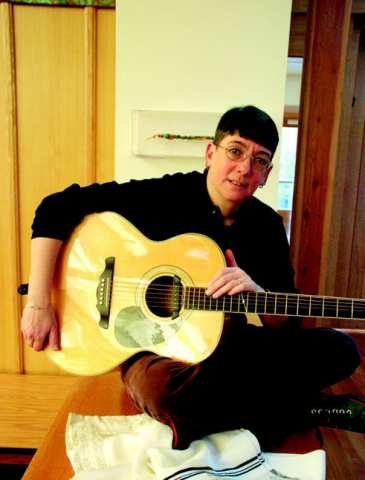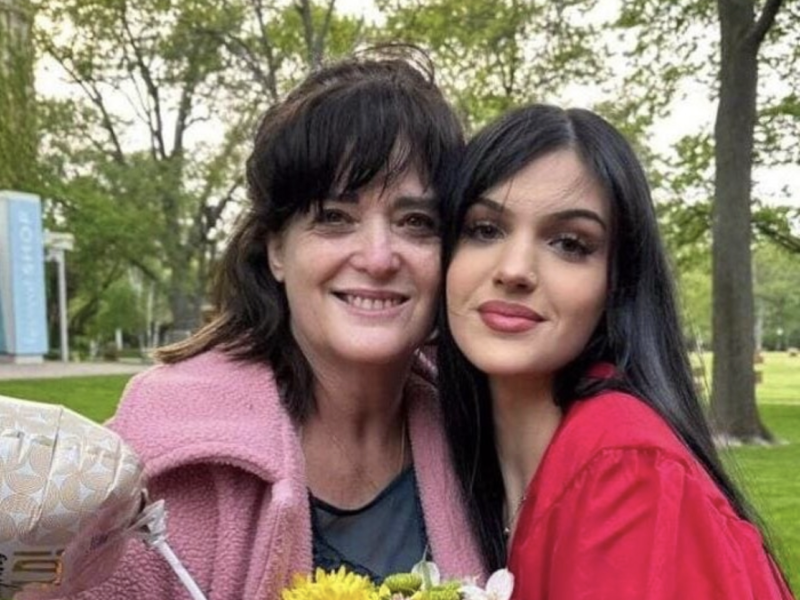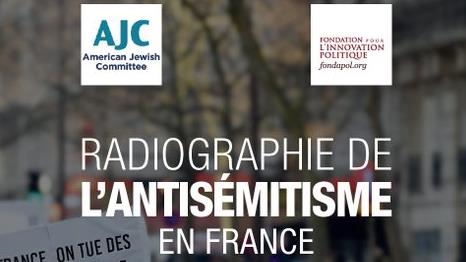
Thanks to the TV show “Portlandia,” Oregonians west of the Cascades are now famous for their highly developed food sensibilities, militant bike activism, flowing long gray hair and ever-intensifying addictions to locally produced artisan coffees, oh-so-perfect pinots and craft beers.
What “Portlandia hasn’t touched on – yet (hint) – is the amount of buzz generated by a number of Oregon’s Jewish composers above and beyond the boundaries of our community. What’s that, you say? Portland has Jewish composers? Most emphatically yes, we do. From classical music to singer/songwriters, original Jewish liturgical melodies, kids’ music and the genesis of the klezmer music revival of the past 40 some years, Oregon boasts a number of composer/musicians who are making Jews and non-Jews alike sit up and listen, all over the world. Here are a few:
Beth Hamon
These days, Beth Hamon (pronounced HAM-on) tends to walk around with a delighted and slightly bewildered smile on her face. Delighted because she’s a finalist at the Fifth International Shalshelet Foundation for New Jewish Liturgical Music Festival. The Shalshelet Foundation, a 501(c)(3) nonprofit, was founded in 2003 by Cantor Ramón Tasat for the purpose of enhancing spirituality and building community through the creation and dissemination of Jewish sacred music. Since 2004, Shalshelet has hosted four international festivals to showcase more than 150 Jewish composers from around the world. Submissions to Shalshelet are open to everyone, which gives all Jewish composers – professional musicians, clergy, students or private citizens – a unique opportunity to reach a worldwide audience. This year’s festival, the fifth, will take place in Miami Feb. 13-17.
Hamon is also bewildered because it’s all so sudden. Less than six months ago, she was a co-owner of a local bike shop and taught religious school as a sideline at Congregation Beth Israel. Although she had been writing original music since 1999 and released her first CD in 2003, Hamon had always thought of herself as a bike mechanic who wrote music. Last fall, after almost 20 years in the bike industry, Hamon left the world of wrenches and spokes behind. Now she’s making her living teaching Hebrew and other religious school classes, as well as leading family services and working with preschoolers at CBI. Hamon is also putting the finishing touches on songs for her second album, “Ten Miles,” which she hopes to begin recording later this year.
Hamon’s relationship to Judaism has not followed a typical path. Born in Brooklyn, Hamon moved frequently as a child before arriving in Gresham in 1975, at the age of 12. “As a kid, I never went to camp, wasn’t a member of a synagogue and was therefore never exposed to the liturgy,” Hamon recalls. “The only prayers I ever learned were the motzi and the first line of the shema.” When Hamon began working at CBI, over a decade ago, she experienced Jewish communal life for the first time. “I had to scramble to learn a lot in a short time, so I could be of use in that community; there was a steep learning curve,” she says.
Because Jews are a minority in America, most Jews grow up with a sense of “otherness” as a core part of their identity. By virtue of her peripatetic childhood, Hamon feels that sense of separateness not only as a Jew in America, but as a Jew among other Jews; being a lesbian gives Hamon added insights and perspectives on difference. “In my music, I’ve felt a need to sift through my personal roots, to explore Jewish otherness and hold it up against my own otherness within the Jewish community,” she says. “There’s a lot of overlap between my otherness and the otherness of Jews in the world; discovering that has helped me feel more at home in the Jewish community and more comfortable in my skin as a Jew.”
Hamon’s music is an idiosyncratic blend of folk, roots, old-time string band music (“the kind you’d hear at contra dances”), pop and an irrepressible energy left over from her previous life as a marching band instructor for Portland Public Schools. Hamon grew up surrounded by music; both her parents were nightclub performers, and she trained as a percussionist, playing both orchestral and jazz gigs around town. An injury to her right hand in 1997 ended her percussion career, so Hamon turned to guitar. An autodidact with unerring rhythmic and melodic timing, she quickly figured out how to accompany herself with a combination of singable melodies and driving rhythms. “There’s something deep and pure about an acoustic guitar that I just love.”
“Some of my songs wouldn’t automatically be considered Jewish music by some people, because they’re not liturgically based,” says Hamon, who wrestles with the definition of “Jewish” music. “I was having an online discussion recently with other Jewish musicians about what makes music Jewish. Some people insisted it has to have a liturgical context and at least some of it needs to be in Hebrew. I think those are hallmarks of a lot of contemporary Jewish music today, but I don’t think they’re absolutely necessary. Jewish music should simply speak to an aspect of a Jew’s life that touches upon their commonality with other people as much as their experience of difference through being Jewish.”
Hamon chose “City of Love,” the title song from her first CD, as her entry for the Shalshelet Festival. “I wrote it in the fall of 2001, while I was taking graduate courses in Jewish education in Philadelphia,” Hamon recalls. “I was very homesick; I felt lost and in need of some kind of personal compass.” In the song, that compass is the prayer Ahavat Olam, which speaks of God’s love for the Jewish people. “God has given us Torah and mitzvot as guidelines; that is a compass I can access no matter where I am in the world,” says Hamon. “The English lyrics of ‘City of Love’ reflect the homesick feelings. I was inspired to call it ‘City of Love’ because of the Love sculpture in JFK Plaza in Center City, Philadelphia.” (The artist who created the Love sculpture, Robert Indiana, also made a similar sculpture with the word Ahava, Hebrew for Love, for the Israel Museum Art Garden in Jerusalem.)
As the Shalshelet Festival draws near, Hamon can barely contain her excitement. “I’m blessed to live in Portland with some extraordinary talent in the Jewish community, but the Jewish music scene here is small, and as a composer I’ve been working in isolation,” she explains. “I hope being at Shalshelet, meeting all kinds of new Jewish composers and performing my song, will get my music more exposure and garner more interest in the kind of Jewish music that I’m writing, and perhaps lead to appearances at other Jewish events.”
David Schiff
Within Portland’s Jewish community, David Schiff is perhaps better known as retired cantor Judith Schiff’s husband.
Elsewhere, he’s known as an accomplished classical composer whose music has been commissioned and performed by ensembles around the world. Two years ago, the Seattle Symphony commissioned Schiff to write a farewell tribute for outgoing music director Gerard Schwarz. “I featured the trumpet section in ‘Canzonetta,’ because Schwarz is a trumpet player,” Schiff explains. “‘Canzonetta’ is a successor to a longer, earlier work I wrote, ‘Canzona.’” Schwarz is now working on a new series about classical music, which will air on PBS; the series will include a performance of “Canzonetta.” The Seattle Symphony has also presented Schiff’s “Fanfare for Israel” and excerpts from his opera “Gimpel the Fool,” “Solus Rex” and “Sacred Service.”
Schiff’s music reaches beyond the Pacific Northwest; both the Minnesota Orchestra and the Virginia Symphony have commissioned works (concertos for timpani and clarinet, respectively). Schiff’s best-known orchestral work, “Stomp,” was performed by the chamber orchestra Concordia, led by Marin Alsop, in New York City in 1990; Alsop later conducted the work with the Baltimore Symphony. The American Composers’ Orchestra presented Schiff’s reworked version, “Stomp Relit,” at Carnegie Hall in 2009. “I’ve also been fortunate to have a number of performances of my work by the Chamber Music Society at Lincoln Center,” Schiff adds.
Two years ago, Portland’s Third Angle Ensemble took Schiff’s “Scenes from Adolescence” to Beijing. “When my music gets performed in Paris and Beijing, I’m very happy, even if the local reception is mixed,” says Schiff, recalling that faculty members at Beijing University were less than enthusiastic about his music, “but the students liked it.” Another of Schiff’s chamber pieces, the “Divertimento” from his opera “Gimpel the Fool,” has been performed in many locales, including the Palais du Luxembourg in Paris. “I think the music of mine that has traveled most is my ‘Sim Shalom,’ which is sung by cantors all over the world,” says Schiff. “Because of Judy’s 32 years as cantor, I’ve written a lot of synagogue music. The cantorial world is very networked, so when a tune makes the rounds and people like it, it gets sung everywhere. That’s as good as it gets.”
Stephanie Schneiderman
Portland singer/songwriter Stephanie Schneiderman has been making waves since 1999, when she released the first of her seven solo albums. Over the last decade, Schneiderman has steadily built a regional audience, and her music is played on contemporary adult radio stations all over the country.
Within the Jewish community, Schneiderman has achieved fame of another sort: she’s the producer of the music for the popular OyBaby series of DVDs and CDs. Schneiderman, along with her sisters Lisa Schneiderman and Kim Palumbis, sang the three-part harmonies heard on OyBaby’s arrangements of classic Jewish melodies. “There’s a nice warmth about singing with your siblings,” says Schneiderman. “We grew up singing together, and there’s a blend that happens naturally because we are influenced by similar things.”
OyBaby creators Rob and Lisi Wolf launched their first DVD for Jewish babies and toddlers in 2002. After the unexpected success of their first DVD, the Wolfs made a companion CD, a second OyBaby DVD/CD, and most recently a third CD, “We Sang That at Camp,” which features Jewish summer camp melodies. Ten years in, OyBaby has sold more than 100,000 products across all 50 states and in more than 20 countries, including Canada, Israel, Brazil and France. Co-creator Rob Wolf reports that sales continue to grow. OyBaby videos are designed to teach very young children basic Jewish melodies for Shabbat blessings and songs for various holidays. Schneiderman was determined to create arrangements that parents would enjoy as much as their children. “I created arrangements which reflected what I grew up singing, because I thought, ‘Instead of making it kids’ music that parents would listen to, let’s make it parents’ music that kids will listen to.’” Wolf agrees. “So much of Jewish music sounded very liturgical, like something a cantor would sing,” he explains. “I think there is a desire and a need for something more like what we heard at Jewish summer camp. Also, it was very important to us that we not dumb down Jewish music.”
OyBaby is a marked departure from Schneiderman’s solo work, and she has reveled in the unexpected opportunities it’s brought to her creative life. “Before OyBaby, I never thought of myself as a producer of children’s music or Jewish children’s music,” she explains. “It was also fun to work with my sisters in the studio. These are the songs I grew up with at Neveh Shalom and at Jewish summer camp; making OyBaby felt like coming back to my roots.”
Lev Liberman
Klezmer music has been enjoying a revival since the mid-1970s. Players and audiences alike, all over the world, continue to fall in love with this swinging, swaggering, virtuosic, improvisatory and deeply emotional instrumental music. All these elements have combined, like gypsum and clinker, to cement klezmer solidly and permanently into the firmament of world music.
Lev Liberman isn’t a bit surprised. The man who co-founded The Klezmorim, the first band to bring klezmer music out of its former obscurity, knew from the beginning that klezmer was here to stay. “I thought the music was so fascinating. It was clear to me that klezmer was a musician’s music; it would attract players because of its complexity and challenge,” he says. “We could take it anywhere and play for anybody. Whether we were busking in the streets of Berkeley or playing Carnegie Hall, we were always successful in attracting audiences and intriguing musicians.”
Liberman, a saxophone specialist who’s been a Portlander since 1986, always saw klezmer’s potential to reach beyond the Jewish community. “We never thought of it as limited to the Jewish community; our audiences were mainstream from the beginning,” he explains. “Before we brought it back, klezmer had been underground for 40 years, so there was no such thing as an audience base.” With the band, Liberman took klezmer to the world. The Klezmorim sold out Carnegie Hall twice in one day, played at L’Olympia and the Théâtre de la Ville in Paris, and headlined at major jazz festivals across Europe.
Today there are more klezmer or klezmer-influenced bands than ever, including Portland’s own Klezmocracy, Vagabond Opera and 3 Leg Torso. They cover a diverse spectrum of sound from traditional to jazz/fusion to rock, avant-garde and beyond. Although Liberman is sanguine about klezmer’s popularity, he was taken aback to realize he’d helped create a genuine cultural phenomenon. “In 1979 or 1980, somebody came up to me in Berkeley and said, ‘Do you realize you guys have made Jewish hip again?’ The idea that someone would ascribe something bigger than the music to klezmer was astounding to us.”
Ilene Safyan
Ilene Safyan, music coordinator at Havurah Shalom and a noted cantorial soloist at both Havurah and Neveh Shalom in Portland, has been a beloved part of Portland’s synagogue music scene for decades. In addition to her congregational work, Safyan is an award-winning recording artist, with fellow Havurahnik Margie Rosenthal. Their six CDs of Jewish music have been recognized by Entertainment Weekly, the American Library Association and The PBS Parents Guide to Children & Media. Safyan’s music has also been featured on XM Radio’s Hanukkah station, Children’s Media Network, WQXR and NPR. Safyan is professional and assured in her established roles as a cantorial soloist and music leader. “I love music and it’s my passion, but other than studying voice, I have no classical training,” she says. “I’m hesitant to call myself a composer because I wasn’t a music major.”
While Safyan may not have thought herself a composer, that didn’t stop her from writing music. “Writing, composing and arranging melodies has been an integral part of my life for all of my life,” she explains.
In 2010 Safyan’s setting of “Petach Lanu Sha’ar,” whose text, “Keep open the gates for us,” comes from the Yom Kippur Neilah service, was selected by the Shalshelet Foundation for its Fourth International Festival, held in New York City. Safyan almost missed the deadline for submitting her music. “I was debating whether to take myself seriously as a composer; I sent in my piece on the last day,” she admits. “Entering Shalshelet’s contest meant taking my music to the next level. I had no expectations about it, although I thought it would be wonderful to have outside acknowledgment that this was a special piece.”
Little did she know. “Since I submitted ‘Petach Lanu Sha’ar,’ it’s been performed all over the country, possibly even the world; because of the Internet and Youtube, things go viral,” Safyan explains. “It’s in a compilation published by Shalshelet, which they send to their supporters before High Holidays.” Being a Shalshelet finalist has also given Safyan a more visible presence outside Oregon. Several college friends, some of whom are now cantors themselves in different areas of the country, have contacted her about performing “Petach Lanu Sha’ar” in their synagogues.
“A friend wrote to tell me that he found himself humming the song during Neilah,” says Safyan. “At Hebrew College in Massachusetts, one of the rabbis received the song. He sent it to all the students, alumni and faculty, saying this was truly a melody that reflected the intentionality of the prayer and was consistent with the nusach (traditional prayer melody) of Neilah. That was a wonderful compliment and incredibly meaningful to me.”
Today, Safyan is happily engrossed in writing several new original compositions. “Shalshelet was an absolute delight and joy; it’s connected me to a lot of people who love the things I love, and it sparked all sorts of creative places inside me. I’ll definitely submit my work again.”
Through the Shalshelet Foundation and its ongoing mission to disseminate contemporary Jewish music, both Safyan’s and Hamon’s compositions will reach beyond Portland to find Jewish musicians in communities throughout North America, Israel and the world. The fact that Portland, with its relatively small Jewish community (as compared to New York or Los Angeles), can boast two Shalshelet finalists, speaks to the ruach, depth and skill of our city’s Jewish composers. Yasher koach!
Elizabeth Schwartz is the program annotator for the Oregon Symphony and a freelance writer living in Portland. She has been married to Beth Hamon for 11 years.





